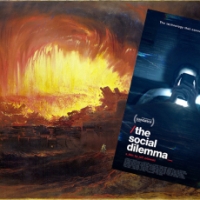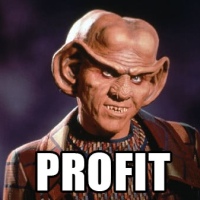Apple Is Not the Messiah
There is a lot of money to be made in crafting carefully manicured public relations campaigns for major corporations. Numerous large firms exist solely for the purposes of selling their expertise on these matters to large companies. Indeed, many businesses even have their own PR and advertising teams working tirelessly to ensure that their company’s image is never tarnished. A heck of a lot of work goes into designing those posters you see as you’re walking down the street and into those advertisements that interrupt whatever you’re watching. Granted, sometimes the most brilliant PR firm is the United States government.
Don’t believe it? Just look at Apple.
You cannot buy exposure and publicity like that which Apple earned when the company announced it would not comply with a court order to help the FBI unlock an iPhone. Apple is a corporation that knows a thing or two about creating successful advertising campaigns, but it’s hard to imagine the company being able to dream up a PR coup as brilliant as this one. While Apple has shown itself highly skilled in designing campaigns to sell new devices, the FBI is helping Apple sell itself as a company truly and deeply committed to defending its users privacy. It can be expensive to pay for celebrity endorsements, but thanks to the FBI Apple has received ringing accolades from the likes of Edward Snowden, numerous tech companies, and some of Apple’s fans are even calling for rallies to be held at Apple stores.
It may seem that this story is as simple as a tech company bravely standing up for its users’ civil liberties – a case of the bold tech-David defying the demands of the overreaching government-Goliath. And yet, it is generally wise to view the actions of massive corporations – even their supposedly noble actions – with a healthy degree of skepticism. After all, Apple remains a company that is literally trying to sell you something. What this kerfuffle between the FBI and Apple reveals is the way in which technology companies today are not content to simply sell products, they are also involved in selling an ideology. And it is selling quite well.
It is worth recognizing that the Apple story is rather complex, and it should also be noted that one can believe that Apple has done the right thing while still doubting that Apple has done it for anything resembling the right reason. The court order that the FBI has secured has to do with unlocking the iPhone that belonged to one of the people involved in the San Bernardino attack that took place in December. Apple seems to be concerned that if they should build the FBI some kind of skeleton key to access that particular iPhone then the FBI will eventually be able to use this key to gain access to other iPhones in the future. It may be that a showdown between tech companies and the government surrounding issues of encryption has been coming for a long time – but if that’s the case (and it probably is) fans of encryption should not be feeling too excited here. The case at the core of this argument does not involve some noble hacker, or misunderstood free-speech activist, but the phone belonging to an individual who was involved in killing 14 people. This is not to say that Apple is wrong in expressing concern over governmental overreach, nor is it to say that Apple is just being paranoid in thinking that the FBI might be interested in cracking the encryption on other iPhones, nor is it to say that Apple’s worries that if they bend to the FBI they’ll have to bend to other (much more repressive) regimes in the future is unfounded. And yet, when the issues around encryption can be so easily framed in terms of “the FBI needs access to the information on an encrypted phone that belonged to a terrorist” it is hard to imagine Congress or higher courts having terribly much sympathy for Apple. Those who spend a lot of time discussing politics and ethics are likely familiar with the old saw that “extreme cases make for bad ethics/politics” – this legal case exists at the extreme and it is going to likely result in a governmental response that bears the marks of the extremity of the political situation to which it is tied. Indeed, it may just be that Apple knows it will have to comply eventually, but knows that there’s a lot to be gained by raising a big stink about it now. Apple knows that privacy is a product that it can sell.
Here is an uncomfortable question for you to ponder: Whom does Apple serve?
Based on many of the responses praising Apple for defying the FBI one could easily think that Apple serves the people. Its noble users! The cause of civil liberties! Truth! Justice! The American Way! Freedom! Or…it could be that Apple really just serves its stockholders.
Apple is a business. It may occasionally pledge fealty to values like civil liberties, but in the end the real values the company is interested in are those of the financial variety. And, at risk of being accused of cynicism, it seems that such fiduciary concerns are at the heart of Apple’s opposition to the FBI. If Apple had simply agreed to go along with the court order the company would have been savaged by the tech press and by encryption advocates who would have insisted that Apple devices could not be trusted. The company would have been painted as being a tool of big brother – and it is quite likely that this negative attention would have hurt Apple’s value. Instead, Apple is now being praised for protecting civil liberties, Tim Cook is being lionized, and the encryption community is respectfully doffing its hats at Apple. In the post-Snowden era, privacy has become a powerful ideological force in discussions around technology – and the corporations that have made the devices that make the invasion of personal privacy so easy, know that they stand to win over a lot of customers if they can paint themselves as patrons of privacy. But ultimately, the winner isn’t really civil liberties, or encryption – the winner is Apple. And the loser in this situation is not the government, but Apple’s rival companies, which are likely wishing that the FBI was trying to gain access to a phone using the Droid operating system so that they could reap the public accolades for defying the courts.
Granted, in the midst of this thinking about civil liberties, government overreach, and massive tech companies, it is worth pondering the collision of technology and democracy. Say what you will about the FBI, the courts, and Congress – but such entities (at least ideally) are meant to serve the populace. Many people are feeling very cynical about the government these days (understandably) – but one of the reasons that Apple is pushing back against the FBI is because the company is arguing that Congress needs to pass some kind of law on this matter. But members of Congress are elected by people, and those constituents can give their elected officials an earful. To be clear, this is not meant as some rosy optimistic view of the state of the US government. The point is not to be naïve. But while one should not be naïve about the government, one should also not be naïve about massive corporations. When grumbling about how unresponsive government is at present, while shaking fists at how unaccountable government has become, it is worth asking: how accountable are massive corporations? Apple is one of the wealthiest and most powerful companies in the world today – and they owe zero fealty to a democratic electorate.
Apple does not serve you the citizen, it just wants to sell doodads to you the consumer; but the company is smart enough to know that sometimes the best way to fleece the consumer is to act like it cares about them as a citizen. In a tug-of-war between a surveillance state apparatus run wild and a corporation that has become a sovereign power, in and of itself, the loser is democracy. And it may be precisely the impotence of democracy that presents Apple with such a wonderful opportunity to paint itself as a savior. Speaking many decades ago the labor leader Eugene Debs warned against the desire to seek a savior, writing:
“if you are looking for a Moses to lead you out of this capitalist wilderness, you will stay right where you are. I would not lead you into the promised land if I could, because if I led you in, some one else would lead you out.”
Change “capitalist wilderness” to “surveillance state” and these lines function as a perfect retort to unbridled enthusiasm for Apple. There is understandable anxiety about the amount of information a leering government can gather on citizens whose every move is tracked thanks to Internet connected devices. And it is understandable that smart phone users should look for a Moses to lead them out of the surveillance wasteland and into the tech enabled Promised Land. But Apple is a false prophet, in pursuit of real profit. As long as people act like the solution to our technologically exacerbated problems is more technology, and as long as people move their faith from an unaccountable government to an unaccountable company, the calls of Moses impersonators will draw excited responses.
And we will stay right where we are.
Hoping that maybe the next Moses will be the real thing.
Related Content
With Great Technological Power, What of Responsibility?
You’re Caught! A review of “Dragnet Nation”











I think you have it all figured out. Wonderful analysis and post.
Pingback: Evidently, Democracy Disrupts the Disruptors | LibrarianShipwreck
Pingback: Planned obsolescence comes for the headphone jack | LibrarianShipwreck
Pingback: In the wake of Apple v FBI, we need to address some uncomfortable truths | Julia Powles